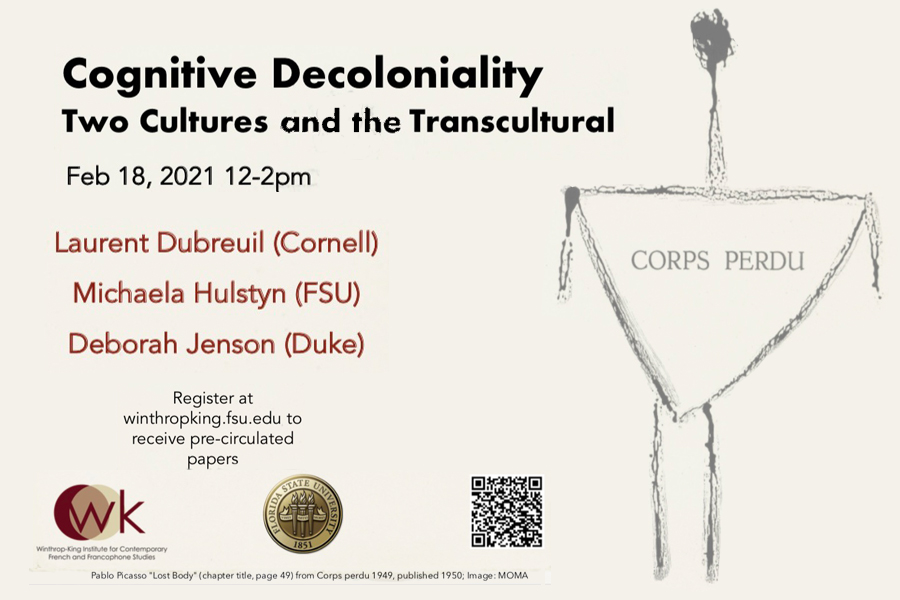Cognitive Decoloniality: Two Cultures and the Transcultural

About the Event
Exploring the Mental Experiences of Transcultural Literature
from the Caribbean to the Maghreb
This one-day symposium explores the fruitful connections between cognitive science and transcultural literature in the Francophone world from the perspective of decoloniality, literature, and mind in texts from Francophone North Africa and the Caribbean. Through pre-circulated papers and a round-table event, the symposium seeks to imagine new relationships between the “two cultures” (the humanities and the sciences) while simultaneously evaluating the theoretical demands that decolonial and transcultural literature require.
The events are free and open to the public. The final program will be posted closer to the event. For further information, please contact the organizers, Michaela Hulstyn (mhulstyn@fsu.edu) or Martin Munro (mmunro@fsu.edu).
Deborah Jenson (Duke University) is the author of many works on French and Caribbean literature and culture, including "Beyond the Slave Narrative: Sex Politics, and Manuscripts in the Haitian Revolution" (Liverpool UP, 2011). She is currently working on two monographs in cognitive literary studies: "Essays on Mimesis: From Marx to Mirror Neurons," and "Phenomenological Courage: Afro-Carribean Literary Challenges to the Epistemic Brain in Naturalist Modernity." Her paper couples Miriam Chancy’s neologism “autochthonomy” with Sylvia Wynter’s conception of “the crisis of the Caribbean as exemplified in the Haitian situation” (“The Pope Must Have Been Drunk,” 1995) to propose the value of framing human cultural systems in their adaptive, bidirectional relationality to the human nervous system (Turner and Pöppel, “The Neural Lyre,” 1988). The paper argues for the necessity of engaging the legibility of “discursive practices within African and African Diasporic histories and cultures” (Autochthonomies, 2020) outside of the Western constraints of literary regional periodicity. Reading Nau’s tales “Un Épisode de la révolution, conte créole” (1836, 1837) and “Le Lambi” (1837) for both their cognitive mise-en-abyme of storytelling and their registration of unexpected sensory stimuli, Jenson explores notions of “distributed mind” as a “supra- or transindividual activity distributed across groups functioning in specific contexts, rather than as a wholly internal process unfolding within the minds of solitary, autonomous, and de-situated cognizers” (Herman, 2007), and of poetics as a defamiliarizing process for the purposes of enhancing difference-attuned somatosensory and perceptual activation. The paper asks: “Can the neural be a critical pathway to decoloniality?” Following Wynter, it must, Jenson argues, if we are to identify the “extraterritoriality of (self-)cognition” and the modalities through which our social reality “organizes itself as an autopoetic, ‘languaging living system’” (“The Ceremony Found,” 2015).
Laurent Dubreuil (Cornell University) is a scholar of the humanities and the sciences whose work explores the powers of literary thinking at the interface of social thought. His ongoing book projects on cognitive science and the humanities include "Poetry and Mind," a vast consideration of the mental experience of poetry across languages, geography, and time, and "Dialogues on the Human Ape," an inquiry on human and animal minds, co-authored with scientist Sue Savage-Rumbaugh. He is the author of "The Refusal of Politics" (Edinburgh UP, 2016) and "The Intellective Space" (University of Minnesota Press, 2015), among many other monographs and articles in both French and in English. Dubreuil is also finishing a study of the extinction of modernity in Charles Baudelaire. In his time as a Mellon New Directions fellow, Dubreuil investigated the cognitive study of language and non-standard logic as part of his larger study of the relationships between language and literary thought. At FSU, he will present research from his "Poetry and Mind" project by exploring maximal semantics with a case study taken from the poetry of Aimé Césaire. His talk will also offer additional considerations about the interplay between Caribbean opacity and transcultural meaning production.
Michaela Hulstyn (FSU) is a specialist on the phenomenology of subjectivity and intersubjectivity during altered states of consciousness in the Global French 20th century. Her first monograph is titled "After Unselfing: Altered States in Global French Narrative." She is beginning work on a second project in cognitive literary studies, tentatively titled "Thinking and Feeling with Francophone Literature." This project builds a cognitive account of the evolving relationship between experimental texts produced from postcolonial Francophone situations at the end of the 20th century and the competing expectations of their different audiences. Her talk, “Neural Signatures of the Bilingual Text: Reading Transcultural Space and Bilingual Time” explores multilingual subjectivity in the work of Abdelkebir Khatibi. She will consider Khatibi’s concept of the pensée-autre and the reading experience that the multilingual texts make possible in conversation with the work of Catherine Malabou and Lera Boroditsky.
12:00 to 12:45 p.m. EST: Preliminary comments and questions on pre-circulated papers
Laurent Dubreuil, Deborah Jenson, Michaela Hulstyn
12:45 to 1:00 p.m. EST: Break
1:00 to 1:30 p.m. EST: Round table discussion: The Two Cultures and the Transcultural
1:30 to 2:00 p.m. EST: Q&A
